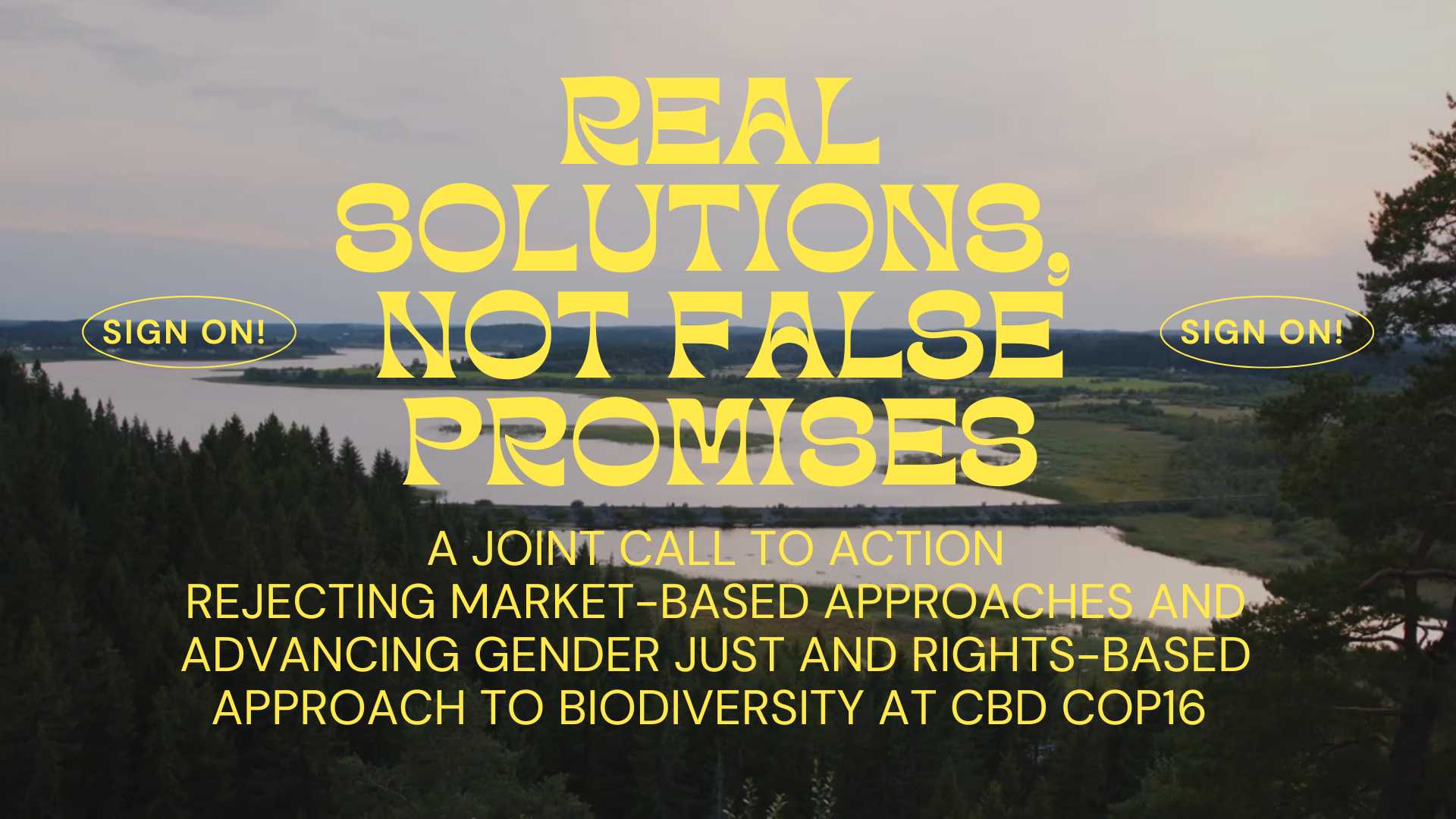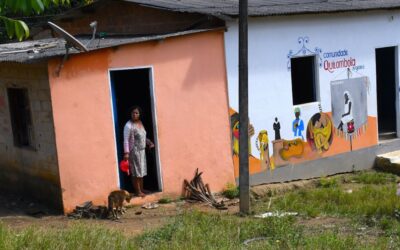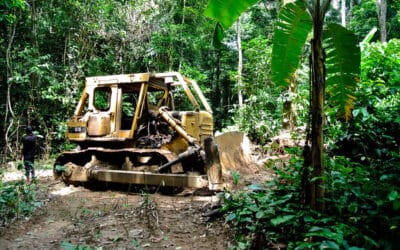Real Solutions, Not False Promises:
A Joint Call to Action for Rejecting Market-Based Approaches and Advancing a Gender Just and Rights-Based Approach to Biodiversity Protection at CBD COP 16
This statement is open for endorsements. To endorse the statement please send an email to GFC@globalforestcoalition.org stating the name of your organisation and your willingness to endorse.
As we approach the 16th Conference of Parties (COP 16) of the United Nations Convention on Biological Diversity (CBD) in Cali, Colombia, we, the undersigned, stand in solidarity with civil society, Indigenous Peoples, Local Communities, Afro-descendants, peasant farmers, women, and youth movements to urgently call for a strict and binding target to halt deforestation and biodiversity loss.
The global biodiversity crisis demands immediate action that:
- respects rights through ecosystem and biocultural approaches,
- prioritizes the inherent and collective rights of Indigenous Peoples, promotes gender-just solutions,
- recognizes the rights of ecosystems and human dignity,
- and elevates traditional knowledge and the leadership of local communities in all their diversities—over corporate and market-driven approaches.
Context and Rationale
At the heart of our call is the recognition that false solutions, driven by the financialisation and commodification of nature, will only deepen the environmental crisis, climate crime, and human rights and social crises. We firmly believe that real solutions come from the ground through the practices of Indigenous Peoples, Local Communities, Afro-descendants, women, youth, peasant farmers, and other affected groups who have long demonstrated their affinity to protect nature.
The biodiversity and climate crises are deeply interconnected. There is no path to saving biodiversity without also addressing the climate emergency. This will require systemic change that is decolonizing, non-patriarchal and grounded in a holistic understanding of forests and ecosystems as systems of life and culture.
Key Policy Calls and Recommendations for Parties
1. Urgent Action on Biodiversity Loss
Halt biodiversity loss and deforestation by addressing the structural drivers, namely extractivism, including mining, fossil fuel exploitation, monoculture tree plantations, extensive industrial agriculture, unsustainable livestock production and large-scale infrastructure projects. The real solutions come from Indigenous Peoples, Local Communities, Afro-descendants, peasant farmers, women, and youth movements and we call for clear targets that limit harmful activities rather than leaving biodiversity to market forces.
Critically assess the failures of the previous Strategic Plan for Biodiversity 2011-2020 and the gaps in KMGBF wording and implementation, ensuring we avoid repeating past mistakes.
Ensure that corporate actors and their beneficiaries are made fully responsible for the biodiversity loss they cause; implement binding regulations and full, independent verification of all corporate claims to be protecting biodiversity; and ensure that ‘consumers’ are not made responsible for taking action without the regulatory frameworks needed.
2. Reject Market-Based Approaches
Challenge market-driven conservation models and false solutions such as biodiversity and climate offsets and credits and so-called nature-based solutions, which commodify nature and prioritize profit over ecological integrity, while also delaying action to reduce emissions and stop biodiversity destruction.
3. Urgent implementation of a rights-based approach to biodiversity conservation.
Promote non-market-based, ecosystem approaches that respect the rights of Indigenous Peoples, Local Communities, Afro-descendants, peasant farmers, women, youth, and Nature. Ensure that biodiversity finance is transparent, equitable, gender-responsive and aligned with the three objectives of the Convention on Biodiversity and its Gender Plan of Action (GPA).
A rights-based approach should include both the rights of Mother Nature and the customary and collective rights of Indigenous Peoples, Local Communities, Afro-descendants, peasant farmers, women, and youth movements. Both rights are deeply interdependent, complementary, and inseparable.
4. Stop forest fires and biodiversity destruction
In recent years, we have witnessed an alarming increase in forest fires in Indigenous territories and community lands motivated by the greed of agri-business to appropriate and exploit these territories, facilitated by domestic policy and legislation. By setting fire to forests, they are also setting fire to key biodiversity areas, destroying our life systems, and our right to a future with food sovereignty. There is no biodiversity without forests. We urgently call on Parties and other stakeholders including the private sector and corporations to stop burning our forests if we want to conserve and protect nature and its life-supporting resources.
5. Defend Indigenous, Women, Youth, Children, Afro-descendants, Peasant Farmers and Local Community Leadership
Ensure the full and meaningful participation of Indigenous Peoples, Local Communities, Afro-descendants, peasant farmers, women, children and youth movements in all decision-making processes related to forests and biodiversity.
Defend land and cultural rights, and advocate for equitable access to resources for those on the frontlines of biodiversity protection, especially women, who face both environmental destruction and patriarchal systems of exploitation. Ensure access to information for all rights holders and an equitable governance approach to conflict resolution in Indigenous territories.
Ensure the protection of nature, forest, biodiversity, environmental, and human rights defenders.
Prevent biodiversity loss caused by agribusiness, commercial monoculture plantations, and extractive industries by implementing strict national laws and regulations while respecting free, prior, and informed consent of the communities. Indigenous Peoples and local communities have the right to say no.
6. Promote Traditional Knowledge and Agroecology
Uphold and promote the traditional knowledge and practices of Indigenous Peoples, Local Communities, Afro-descendants, peasant farmers, women, and youth, which have proven effective in conserving forests and biodiversity and mitigating climate change.
Advance agroecological practices and the rights of small-scale farmers, fishers, and forest communities, as recognized in the UN Declarations on the Rights of Indigenous Peoples (UNDRIP) and the Rights of Peasants and Other People Working in Rural Areas (UNDROP).
We call for recognising, respecting, and implementing UNDRIP and UNDROP in all forest and biodiversity-related policies, legislations, and agreements.
7. Resource Mobilization for Real Solutions
Secure legally binding commitments to mobilize public resources for biodiversity protection, rejecting private sector-driven and market-based initiatives that favor profit, extractivism, and greenwashing over ecological balance and justice.
Ensure gender-responsive biodiversity finance plans that prioritize local, community-led solutions and direct access to finance, without the interference of intermediaries or corporate interests, to support such community initiatives.
8. Eliminate Harmful Subsidies
The immediate elimination of harmful public and private subsidies that drive biodiversity loss and climate change, such as those supporting fossil fuels, industrial agriculture, commercial monoculture plantations, and large-scale bioenergy. Identify and address the public and private financial flows causing biodiversity loss and associated environmental harm which, according to UNEP, added up to 7 trillion USD in 2023.
9. Protected Areas and Community Governance
Dismantle colonial forms of fortress conservation and decolonise existing protected areas. Any establishment and expansion of protected areas must respect and recognise the traditional and collective rights of Indigenous Peoples over their homelands and territories of life; protect the rights of Local Communities, Afro-descendants, peasant farmers, women, children and youth; ensure free, prior and informed consent as enshrined in the UNDRIP and other relevant declarations and equitable and effective governance of territories and homelands designated as protected areas; and guarantee that these populations not be marginalized, displaced, excluded or attacked in the name of conservation.
10. Traditional Knowledge and Article 8j
Ensure full and effective implementation of Article 8j of the CBD, recognizing the vital role of traditional knowledge in biodiversity conservation. This must be done with the full participation and free, prior, and informed consent of Indigenous Peoples and Local Communities, as well as the inclusion of Afro-descendant peoples as collective rights holders, and the benefits must be equitably shared.
Article 8j should prioritize the development and implementation of Biocultural Community Protocols (BCP) with full and effective participation of Indigenous Peoples and Local Communities, particularly women, children and youth, to ensure community-led conservation, sustainable use of biodiversity, and just access to benefit sharing.
11. Digital Sequence Information
Fully apply CBD principles of free, prior and informed consent, and access and benefit sharing to every Digital Sequence Information (DSI) database, whether public or private, and to everyone who benefits directly or indirectly from DSI. Database operators must ensure good governance for every database, naming the country of origin and ensuring transparency regarding links to traditional knowledge, while ensuring that resources are only uploaded if they have been legally obtained. Parties that fund, sponsor, or host databases must also ensure good governance.
Call to Action
COP 16 in Cali, Colombia, presents us with an opportunity to reaffirm our collective commitment to forest and biodiversity conservation and the rights of people and communities. The voices of Indigenous Peoples, Local Communities, Afro-descendants, peasant farmers, women, children, youth, and grassroots movements must be central in shaping the policies that will govern our shared future. We call on all governments to prioritize people and the planet over profit in a way that is just and equitable, gender-responsive, rights-based, and rooted in a non-market-based approach led by real, community-led solutions.
Beyond the Biodiversity COP in Cali, our road leads to the United Nations Framework Convention on Climate Change (UNFCCC) COP 30 in Belém do Pará, Brazil, in 2025—a crucial milestone in global climate action. The struggles to protect forests and biodiversity and address the climate crisis are deeply intertwined. Only by addressing the root causes of climate change and biodiversity loss can we hope to achieve a sustainable future for all.
The time to act is now. Let us stand together, amplifying the voices of those who have cared for the earth for generations and ensure that any global policy and agreement to reduce deforestation, halt biodiversity loss and address climate change is an instrument for justice, equity, and the protection of life in all its forms.
Endorsed by:
A.N.G.R.Y. (Alliance of Non-Governmental Radical Youth)
Armenian Forests
Asamblea Mundial por la Amazonía
Association Jeunesse Verte Internationale (AJVI – AJVC)
Blue Dalian
The Campaign to STOP GE Trees
Centro de Capacitación e Investigación de la Mujer de Tarija (CCIMCAT)
Centro de Estudios Heñói, Paraguay
Colectivo VientoSur, Chile
Ecuadorian Coordinator of Organizations for the Defense of Nature and the Environment (CEDENMA)
Émergence ONGD RDC
Federation of Community Users Nepal (FECOFUN)
Friends of the Siberian Forests
Fundacion Solon
Gamarjoba, Georgia
Global Forest Coalition (GFC)
Global Justice Ecology Project
Global Justice Now
Instituto para el Futuro Común Amerindio (IFCA)
International Association of River Keepers Eco-TIRAS (Moldova)
Mesa Afrodescendiente de Justicia Climática de Centroamérica y el Caribe (AfroClimaCC)
Reacción Climática – Bolivia
Red Dominicana de Estudios y Empoderamiento Afrodescendiente – RedAfros -, República Dominicana
Sihyta
Union for Defence of the Aral Sea and Amudarya
War on Want




